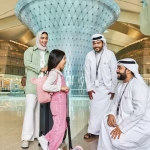Ramadan is one of the most significant and spiritual times of the year for Muslims worldwide. In the UAE, Ramadan is celebrated with deep reverence, marked by daily fasting from dawn until sunset, community bonding, and a heightened focus on charity and goodwill.
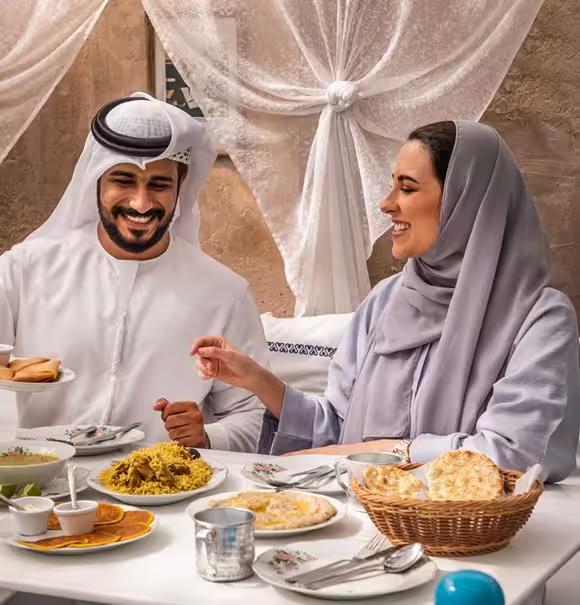
As travellers and residents prepare for this holy month, it’s important to understand not only the customs and traditions surrounding Ramadan and Iftar but also the foods, etiquette, and practical tips for making the most of the Ramadan experience in the UAE.
What is Ramadan?
Ramadan is the ninth month of the Islamic lunar calendar and is regarded as the holiest month for Muslims. During Ramadan, Muslims fast from dawn until sunset, abstaining from food, drink, and smoking. It is compulsory for all adult Muslims, with the exception of those who are ill, pregnant, or elderly. The daily fast is broken at sunset with a meal known as Iftar, which is traditionally opened with dates and water.
When does Ramadan start and end in 2025?
Ramadan follows the lunar calendar, so the exact dates shift each year. In 2025, Ramadan is expected to start around 28 February and end on 30 March, depending on the sighting of the moon. Ramadan concludes with the celebration of Eid al-Fitr, a festival that marks the end of fasting.
What is Iftar?
Iftar is the meal that breaks the daily fast at sunset. It begins with the traditional consumption of dates and water, followed by a larger meal. Iftar is a communal event, often shared with family, friends, and even strangers. Many mosques and community centres offer free meals to those in need.
When is Iftar?
The exact timing of iftar varies by location and changes daily as the sunset time shifts. Local mosques and prayer timetables provide accurate timings. Typically, Muslims break their fast immediately after the Maghrib (sunset) prayer.
Ramadan Traditions in the UAE
Ramadan is not just about abstaining from food and drink, it is a time for heightened spiritual awareness. Muslims engage in increased prayer, reading the Qur’an, and acts of charity. The UAE, with its predominantly Muslim population, embraces this spirit with community activities, charity events, and religious observances that enhance the atmosphere of reflection and gratitude.
There are several key traditions that shape the experience of the holy month:
1. Taraweeh Prayers
In addition to the five daily prayers, Muslims engage in Taraweeh prayers after Isha (night) prayer during Ramadan. These prayers are a communal activity held at mosques throughout the UAE. The atmosphere is serene, and mosques are often filled with worshippers, creating a sense of unity and devotion.
2. Charity and Zakat
Ramadan is a time for increased charity. Muslims believe that during Ramadan, the rewards for acts of kindness and generosity are multiplied. One of the pillars of Ramadan is the practice of Zakat, a mandatory form of almsgiving. Many Muslims use this time to donate to charity, whether through money, food, or their time. In the UAE, large-scale charity initiatives are launched during Ramadan, and many people also participate in Iftar and Suhoor charity meals.
3. The Iftar Meal
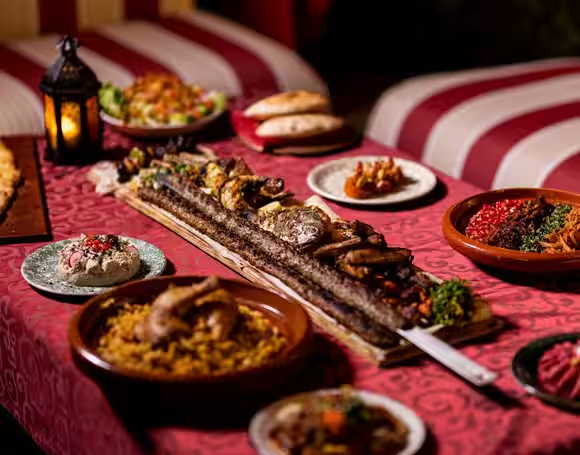
The Iftar meal is the highlight of Ramadan days, and in the UAE, it is an extravagant affair. Families and friends gather to break their fast together, often at home or in hotels, restaurants, and mosques. The meal is usually opened with dates and water, followed by traditional dishes that are shared among family members. Iftar is often followed by Taraweeh prayers, and many people enjoy socialising afterwards.
What do travellers need to know about visiting the Middle East during Ramadan?
Travelling during this time of year is a unique cultural experience, but it requires some preparation and awareness:
- Public behaviour: Eating, drinking, or smoking in public during daylight hours is considered disrespectful and is prohibited in many regions. However, designated areas for non-Muslims to eat may be available, so it’s important to check.
- Business hours: Many businesses, including restaurants, government offices, and shops, alter their working hours, often opening later in the day and staying open late into the night.
- Transportation: Traffic can be heavier just before Iftar, as people rush home to break their fast.
- Tourist attractions: Some tourist sites may have limited hours, so plan accordingly.
- Hotels and restaurants: Most high-end hotels accommodate non-fasting guests and serve food discreetly.
Etiquette during Ramadan
To show respect for local customs, consider the following:
- Avoid public eating and drinking: Refrain from consuming food or beverages in public before sunset.
- Dress modestly: In some countries, a stricter dress code is observed during Ramadan, so covering shoulders and knees is recommended. This includes for children.
- Be mindful of music and entertainment: Loud music and public displays of affection are discouraged.
- Greet people respectfully: Saying “Ramadan Mubarak” (Blessed Ramadan) or “Ramadan Kareem” (Generous Ramadan) is appreciated.
- Join an Iftar meal: If invited, it is considered an honour, and participation is encouraged.
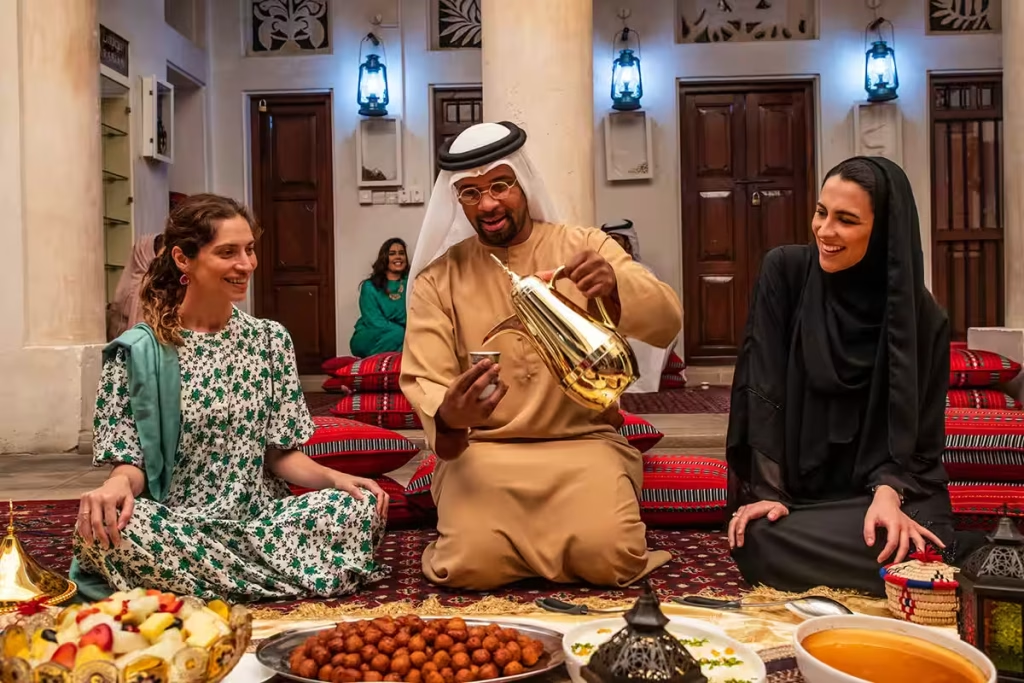
Experiencing Ramadan in the UAE
The UAE is one of the most popular travel destinations in the Middle East, and Ramadan is a particularly special time to visit. Here are some key experiences:
- Ramadan tents and buffets: Hotels and cultural centres set up lavish iftar and suhoor buffets, offering traditional Middle Eastern and international cuisine.
- Cultural events: The UAE hosts a variety of Ramadan-related cultural activities, including Islamic lectures, exhibitions, and charity events.
- Shopping and night markets: Many malls and souks extend their hours, and special Ramadan sales and promotions are common.
- Traditional hospitality: Locals often distribute food to workers and the less fortunate, showcasing the spirit of generosity.
Must-try Ramadan foods in the UAE
The foods served during Ramadan in the UAE are diverse, combining traditional Emirati dishes with regional and international flavours. Here are some must-try foods:
1. Dates and water
Breaking the fast with dates and water is a tradition rooted in ancient teachings. Dates are rich in natural sugars and provide a quick energy boost after a long day of fasting.
2. Harees
A traditional Emirati dish, harees is made from wheat and meat (often chicken or lamb), cooked together to create a creamy, porridge-like consistency. This comforting dish is often served during Ramadan, especially in the UAE’s large family gatherings.
3. Samboosa (samosas)
Sambosas are deep-fried, triangular pastries filled with a variety of ingredients, from spiced vegetables to meat, or even cheese. They are a popular snack to serve during Iftar and are enjoyed by both children and adults.
4. Luqaimat
These small, deep-fried dough balls are coated in syrup and sprinkled with sesame seeds. A beloved dessert in the UAE, luqaimat is often prepared during Ramadan to share with family and friends after the Iftar meal.
5. Shorbat Al-Ramadan (Ramadan soup)
A comforting soup typically served at Iftar, shorbat al-ramadan is made with a variety of ingredients, including lamb, chicken, or vegetables. It’s light and hydrating, helping to replenish fluids after the fast.
6. Fresh juices
During Ramadan, fresh juices, especially those made from fruits like watermelon, orange, or mango, are commonly served to rehydrate after a long day of fasting. They are a refreshing complement to the Iftar spread.
7. Knafeh
For dessert lovers, knafeh is a must-try during Ramadan. This sweet dish, made from shredded pastry and cheese, is soaked in syrup and garnished with pistachios. It’s a popular choice for Iftar and is often enjoyed with a cup of Arabic coffee or tea.
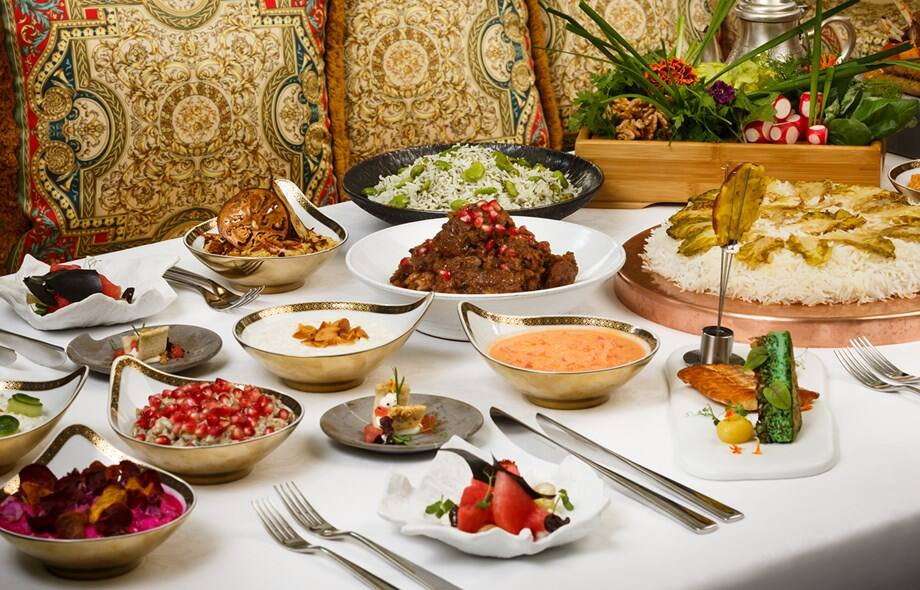
Other traditions associated with Ramadan
Each country in the Middle East has unique Ramadan traditions. Some of the most notable include:
- Cannon firing: In several countries, a cannon is fired at sunset to signal the end of the fast.
- Al-Musaharati: In some areas, a musaharati walks the streets before dawn, calling people to wake up for suhoor by beating a drum.
- Charitable giving: Many businesses and individuals distribute free meals and food packs to the less fortunate.
Experiencing Ramadan in the Middle East is a unique and enriching cultural experience. The region’s deep-rooted traditions, sense of community, and emphasis on spirituality make this a special time for both residents and visitors. Just ensure that if you’re choosing to travel during this month, you are respectful and observe the cultures and customs of the region you are visiting.


